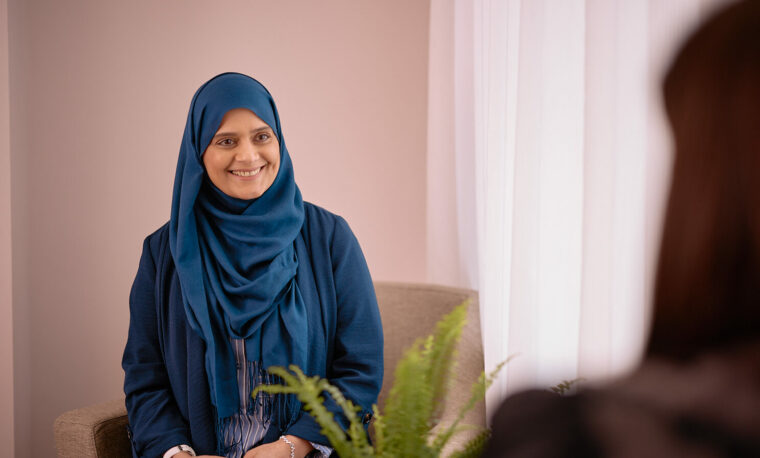What is repetitive transcranial magnetic stimulation (rTMS)?
Repetitive transcranial magnetic stimulation (rTMS), which can also be referred to as transcranial magnetic stimulation (TMS), is a non-invasive method of brain stimulation. The basic principle of repetitive transcranial magnetic stimulation (rTMS) is to target short magnetic pulses over the scalp, in specific brain regions that regulate mood.
rTMS is a medically safe treatment that has been evidenced to significantly decrease symptoms of depression and OCD, as well as individuals suffering from treatment-resistant depression.
It is thought that up to one-third of people with major depressive disorders will not respond to standard treatment (including anti-depressant medications and therapies). For individuals who fall into this treatment-resistant category, rTMS can be a life-changing solution for major depression.
Treatment is delivered in an outpatient setting, with no sedation needed. It is generally well-tolerated by most patients and has minimal side effects.
What happens in an rTMS session?
Our rTMS specialist will carry out an intensive assessment during your first appointment to determine if rTMS is a suitable treatment for you. Our specialist will talk you through the entire treatment procedure, and answer any questions you may have.
Following this, our rTMS specialist will formulate your personalised treatment plan. You will also be given a welcome pack, inclusive of information about rTMS treatment and an appointment tracker.
Your first rTMS session will last an hour. This is to allow for all initial paperwork to be completed and to also locate the ideal positioning for the treatment to take place on your head.
To begin the treatment, you will be seated in a comfortable chair and then given a cap to wear. Measurements will then be taken for head and facial positioning, and your individual motor threshold will be recorded before the treatment commences.
Typically, you will hear a noise and feel a tapping sensation in the head area during the session. To diminish the sound, you will be provided earplugs if you wish.
The entire repetitive transcranial magnetic stimulation (rTMS) session will last approximately 20-minutes, after which you will be able to resume your day without any disruption.
Is rTMS a safe treatment?
Repetitive transcranial magnetic stimulation (rTMS) has been the subject of significant research worldwide, with it being consistently reported to be an effective form of treatment.
In 2008, the Food and Drug Administration (FDA) in the United States of America approved rTMS to treat depression, which is now routinely used in the top hospitals internationally. In 2015, The National Institute for Health and Care Excellence (NICE) in the United Kingdom concluded that rTMS for depression treatment was “safe enough and works well enough for use in the NHS.”
What are the benefits?
- Research and clinical trials worldwide have reported it to be an effective treatment for depression and OCD
- rTMS is a non-invasive treatment, which requires no sedation
- It is an outpatient treatment and is well-tolerated by the majority of people
- People experience minimal side effects
- Daily activities can be resumed immediately after each session (e.g driving)
What are the side effects?
rTMS is generally well tolerated by most patients but can cause some minor short-term side effects including:
- Headaches
- Scalp discomfort at the site of stimulation
- Tingling, spasms or twitching of facial muscles
- Light-headedness
- Discomfort from noise during treatment
- Other rare side effects include seizures (2 per 1,000 cases)
When compared to anti-depressant medication and ECT, rTMS is proven to have far fewer side effects.
Why choose rTMS treatment at Nightingale Hospital?
In 2014, Nightingale (in partnership with MagnaCentre) was the first private hospital in the UK to pioneer rTMS treatment. Since then, we have been the most experienced provider of rTMS treatment in the UK, delivered by our expert and internationally experienced practitioner team.
Not only were we the first private hospital in the UK to deliver repetitive transcranial magnetic stimulation (rTMS) treatment, but we were also the first private hospital in the UK to offer rTMS using a BrainsWay H-coil.
rTMS is typically delivered using a figure-8-shaped coil. The standard figure-8 coil uses a highly focused magnetic field. This type of coil has limitations when it comes to accurately target the specific sections of the brain which are impacted by depression and OCD. By contrast, H-coils supply a wider field and are designed to stimulate the key brain regions more consistently.
There are two main advantages to using noninvasive Deep TMS technology:
- The ability to reach the brain’s deeper brain structures directly helps prevent a decrease in the magnetic field’s intensity. This helps maintain the field’s effectiveness without needing to increase the intensity to a level that risks causing undesirable side effects. H-coils also induce an effective field at a depth of approximately 3cm below the skull, compared to less than 1.5cm for the standard figure-8 coil.
- The ability to avoid the need for an increase in intensity allows dTMS to broaden the scope of its electromagnetic field, reaching more relevant brain regions and structures while maintaining a safe level of activation. The deeper, broader field also enhances the correct brain region targeting, eliminating the need for complex neuronavigation equipment.
It has been suggested that the deeper and wider penetration provided by H-coils accounts for the superior response rate and greater reduction of depression severity reported in the first head-to-head trial between the H-Coil and figure-8 coil published in 2019.
Repetitive transcranial magnetic stimulation (rTMS) at Nightingale Hospital is delivered in partnership with MagnaCentre™, led by the renowned Dr Michael Craig.
When is rTMS not suitable?
- If you have a co-morbid neurological disorder, history of epilepsy and/or neurosurgery
- If you have metal plates in the head/brain, the presence of pacemakers or other electronic
implants, inner-ear implants, metal or magnetic objects in the brain and medication
pumps. (Standard amalgam dental fillings do not pose an issue) - If you are below 18-years-of-age
How much does treatment cost at Nightingale Hospital?
Repetitive transcranial magnetic stimulation (rTMS) treatment starts from £192 per session*.
Most private medical insurers review applications to fund rTMS treatment on a case-by-case basis. Please get in touch with your insurance provider to assess your eligibility. The hospital requires an insurer’s authorisation before treatment can commence.
For detailed billing information, please contact:
Email: rtms@nightingalehospital.co.uk
Telephone: +44 (0)20 7535 7803
*Prices for treatment vary based on the mental health condition.
How do I get rTMS treatment at Nightingale Hospital?
Consultant psychiatrists, GPs and health professionals can all refer patients for repetitive transcranial magnetic stimulation (rTMS) at Nightingale Hospital. All patients will need to be under the care of a Nightingale psychiatrist for the duration of transcranial magnetic stimulation (rTMS) treatment. The referring psychiatrist or GP will receive regular updates on a patient’s progress including HDRS scores upon the commencement of treatment and at discharge.
Enquire about rTMS treatment at Nightingale Hospital
You can make a confidential enquiry using the form below. Our experienced team will endeavour to respond to your request within two business days.
Repetitive transcranial magnetic stimulation (rTMS) enquiry
What our patients are saying
“All first-class, from the moment I arrived each day.”
“This is a really positive option for suffering from depression.”
“The process was extremely fast, efficient, friendly and reassuring.”
“Excellent care and help.”
“I was very happy about the service in every aspect.”
“Staff service I can’t recommend enough. Treatment (from a very sceptical chap!) has been amazing. Feel as though depression never happened! Hope more people use it.”
“Felt like a new man after my course of treatment. My wife and family are all amazed at the change in me!”








